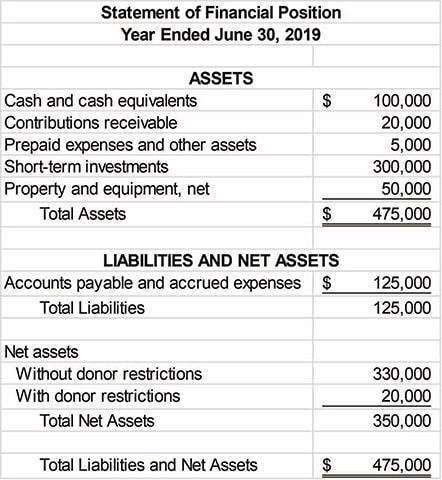Content

Business OperationsBusiness operations refer to all those activities that the employees undertake within an organizational setup daily to produce goods and services for accomplishing the company’s goals like profit generation. Liabilities As Long TermLong Term Liabilities, also known as Non-Current Liabilities, refer to a Company’s financial obligations that are due for over a year . We can take the example of a venture established for a particular going concern concept purpose, like for setting up a shop temporarily for some seasonal work. E.g., selling candles and decorative items around Christmas, where the business comes to an end as soon as the purpose solves. Here, in this case, this assumption cannot be followed as the owner already knows that the duration of business is only a month or two. Regardless of its weak financial standing, the National Company is still considered a going concern.
Going Concern Definition & Examples (Bankruptcy) – Investopedia
Going Concern Definition & Examples (Bankruptcy).
Posted: Sun, 26 Mar 2017 04:16:42 GMT [source]
A case of such information is a company’s inability to continue operating without significant asset sales or debt restructurings. If such was not the situation, a company would basically be acquiring assets when it knows that it will be shutting down its activities and reselling those assets to another organization. However, Generally Accepted Auditing Standards requires an auditor to verify an entity’s ability to continue as a going concern. The Private Securities Litigation Reform Act of 1995 made it much more difficult for a plaintiff to bring suit successfully against a company’s auditors. While the act did codify as law the reporting requirements of SAS 59, it also made it more difficult for a plaintiff’s attorneys to successfully pursue class-action litigation against auditors. Furthermore, in cases where auditors did fail to modify their audit opinions in accordance with SAS 59, the damage awards were limited to proportionate liability.
Going Concern Doubt
For instance, let’s imagine that Bob has invested nearly $50,000 to start a skating rink, only to discover that he couldn’t find a suitable building to buy or lease and that building a new building would be too expensive to be viable. Bob had skates, furnishings and equipment, and he had a name and a logo, but since he never opened the doors his skating rink was never a going concern. DisclaimerAll content on this website, including dictionary, thesaurus, literature, geography, and other reference data is for informational purposes only. This information should not be considered complete, up to date, and is not intended to be used in place of a visit, consultation, or advice of a legal, medical, or any other professional. For more news and reporting on the coronavirus and how CPAs can handle challenges related to the pandemic, visit theJofA’scoronavirus resources page. Are crucial, which determines the ability of Management when major firms fail to generate profits.
- An auditor issues a report about the accuracy and reliability of financial statements based on the country’s local operating laws.
- The new standard was developed in part to meet investors’ concerns about having an early warning signal from auditors for companies in financial distress.
- In many cases, previously prepared budgets may now be of limited relevance given the rapidly changing economic and business circumstances.
- A financial auditor is hired by a business to evaluate whether its assessment of going concern is accurate.
- However, a company can choose to justify their decisions and attempt to make the auditor believe that poor business operating conditions are only temporary.
IMEXA has been in this business for a decade and plans to continue the same for a foreseeable future. For this reason, for purposes of accounting, business enterprises are presumed to carry on their operations indefinitely until such time as they are in fact liquidated.
Are Managements Plans Feasible?
That may not be in the best interests of the users, and I think that’s something management and auditors need to be taking into account. Once the auditor establishes whether conditions and events warrant a going concern evaluation, the next step for the auditor is to ask whether management has performed the evaluation that they are required to perform under the accounting framework as described above. Nigoilia, Inc., the subsidiary must not prepare its financial statements on going concern basis because it can’t continue its operations. Whether iOil, Inc. is a going concern or not depends on the financial hit the parent has suffered due to shutting down of Nigoilia, Inc.
What is going concern value?
Going concern value is a value that assumes the company will remain in business indefinitely and continue to be profitable. Going concern value is also known as total value. … A company should always be considered a going concern unless there is a good reason to believe that it will be going out of business.
Accordingly, the absence of reference to substantial doubt in an auditor’s report should not be viewed as providing assurance as to an entity’s ability to continue as a going concern. Consideration of an entity’s ability to continue as a going concern also falls within an auditor’s jurisdiction under US GAAS . Therefore, it’s important management keeps in mind that a going concern conclusion where substantial doubt exists will absolutely impact the audit report. Another aspect for auditors to consider is that the conditions and events we’re facing should not be considered to be an automatic going concern report for any company. It’s likely that we may see more going concern conclusions, but it’s not automatic.
Advantages And Disadvantages Of Going Concern Concept
The small tech company is not a going concern because it is probable they will be out of business after the lawsuit is settled. The Eastern Company has closed a division but will continue working in its other divisions as usual. The business is a going concern because the closing down of a small portion of business does not impair the capacity of the enterprise to continue indefinitely in the future.

Here, it should also be noted that the assumption is not made that the business will be profitable throughout its existence. For freelancers and SMEs in the UK & Ireland, Debitoor adheres to all UK & Irish invoicing and accounting requirements and is approved by UK & Irish accountants. Harold Averkamp has worked as a university accounting instructor, accountant, and consultant for more than 25 years. Learn financial modeling and valuation in Excel the easy way, with step-by-step training. Certification program, designed to transform anyone into a world-class financial analyst. Information about the recoverability or classification of recorded asset amounts or the amounts or classification of liabilities.
Going Concern Tips For Auditors During The Pandemic
An example of the application of going concern concept of accounting is the computation of depreciation on the basis of expected economic life of fixed assets rather than their current market value. Companies assume that their business will continue for an indefinite period of time and the assets will be used in the business until fully depreciated. Another example of the going concern assumption is the prepayment and accrual of expenses.
Under this concept, it is assumed that the business will operate for a long period of time. When a business is started, it is assumed that it will not be dissolved in the near future. An example showing the application of the going concern principle is the calculation of depreciation of assets. This depreciation calculation is based on the expected economic life of the asset, as opposed to its current market value. The auditor assesses a company’s capacity to proceed as a going concern for a period not more than one year following the date of the financial reports being audited.
Going Concern Vs Liquidation Value
The evaluation period is commonly known as either the assessment period or the look-forward period. Management determines if “substantial doubt” is raised regarding the entity’s ability to continue as a going concern. However, if substantial doubt israised, management would proceed to the next assessment step. Lastly, an important aspect of this is that the disclosures are required by the financial accounting framework to be made by management.
- For example, if due to some internal or external factors, a company cannot continue to make profits or generate enough cash inflows to meet outflows, it going concerned may be questionable.
- It is possible for a business to alleviate an auditor’s perspective on its going concern status by ensuring a third-party guarantee the debts of the company or agree to give extra funding when needed.
- It misleads the investors as the firm may get closed after the preparation and publications of financial statements.
- The auditor still has an important role to play in auditing going concern disclosures under the new standard, but the FASB standard now places the disclosure responsibility on management.
- Unless it is known that the business will close down at a future time, all transactions are recorded in a routine manner and there is no need for any special valuation or adjustment.
- A company is a going concern if no evidence is available to believe that it will or will have to cease its operations in foreseeable future.
The assumption that a business is expected to continue in future affects the timing, nature and amount on which accounting transactions are recorded. For example, one criteria for classification of assets and liabilities into current and non-current is whether they are realized/settled within normal course of business. In a non-going concern basis, income, expenses, assets, liabilities and equity are recorded at values that reflect the winding up of business, i.e. assets are recognized at values they are expected to fetch if sold right away, etc. General purpose financial statements are prepared assuming that the company can and will continue its business in the foreseeable future. If the company is not expected to continue operations i.e. it is required to wind up, its financial statements are prepared using break-up basis. Management’s evaluation is based on relevant conditions and events that are known and reasonably knowable at the date that the financial statements are issued.
Accounting
Specifically related to external funding in the current environment, we’re all very well aware of the Coronavirus Aid, Relief, and Economic Security Act and the funding that is available through a loan program with the U.S. It certainly appears as though most qualifying small businesses will be able to obtain a loan from the SBA to cover payroll and interest on mortgage obligations, as well as rent payments and utility payments for the covered period of that loan. And if those funds are expended as intended, the portions of the loan that are expended in accordance with the program would be forgiven.
The going concern concept states that a business will continue its operations for the foreseeable future. This implies that the company will not be forced to discontinue its operations and liquidate its assets at extremely low costs. The auditors conduct their own evaluation to see weather the going concern assumption is appropriate or not at the time of auditing financial statements even if the company claims to be a going concern. The going concern concept of accountingimplies that the business entity will continue its operations in the future and will not liquidate or be forced to discontinue operations due to any reason. A company is a going concern if no evidence is available to believe that it will or will have to cease its operations in foreseeable future. In case the auditor decides to qualify their audit report, it may raise the issue of whether assets are already impaired, which may highlight the need to write down the value of the assets from their carrying value to liquidation value. However, a company can choose to justify their decisions and attempt to make the auditor believe that poor business operating conditions are only temporary.
Conditions And Events
How big should be the business to be subjected to the going concern principle? There has been a misconception that only the publicly traded business should adhere to the going concern. It is not true because every business, despite its size, is somewhat wedged under the going concern assumption. We want to ensure that you are kept up to date with any changes and as such would ask that you take a moment to review the changes. You will not continue to receive KPMG subscriptions until you accept the changes.
Business only suffer when it doesn't make enough sales to generate more cash…
As long as the business is selling its service or product the business will continue to live.. (Going concern concept)
— Stanley Dennis (@StanleyDennis_) November 2, 2021
Certainly, as we alluded to, there are probably a handful of unique considerations that require the auditor to use professional judgment when applying the requirements of the standards. Questions about the operational efficiency of its Long-term assets, while to meet its dues, the Assets are being sold.

Even if the business’s financials aren’t audited, an accountant who has concerns about the business’s viability should disclose those concerns to the business owner. Before an auditor issues a going concern qualification, company leadership will be given an opportunity to create a plan to take corrective actions that can improve the outlook for the business. If the auditor determines the plan can be executed and mitigates concerns about the business, then a qualified opinion will not be issued. A financial auditor is hired by a business to evaluate whether its assessment of going concern is accurate. After conducting a thorough review of the business’s financials, the auditor will provide a report with their assessment. An entity is assumed to be a going concern in the absence of significant information to the contrary.
The state-owned company is a going concern despite its poor financial position. If the going concern assumption did not hold true, then it would not be possible to record prepaid or accrued expenses as such. The most critical reason that auditors might fail to issue a going-concern opinion, however, could be a fundamental misunderstanding of the assumption itself. Management’s evaluation of the significance of those conditions and events and any mitigating factors. This information may be different than what you see when you visit a financial institution, service provider or specific product’s site. All financial products, shopping products and services are presented without warranty. When evaluating offers, please review the financial institution’s Terms and Conditions.
Extraordinary circumstances call for extraordinary measures. @narendramodi's vision for a $5 trillion economy was based on the going-concern concept which may not hold true anymore. All the discussions on short-term inflation, fiscal deficits and credit ratings have to pause.
— Debabrata Bhaduri (@DBhaduri94) April 30, 2020
Author: David Paschall


